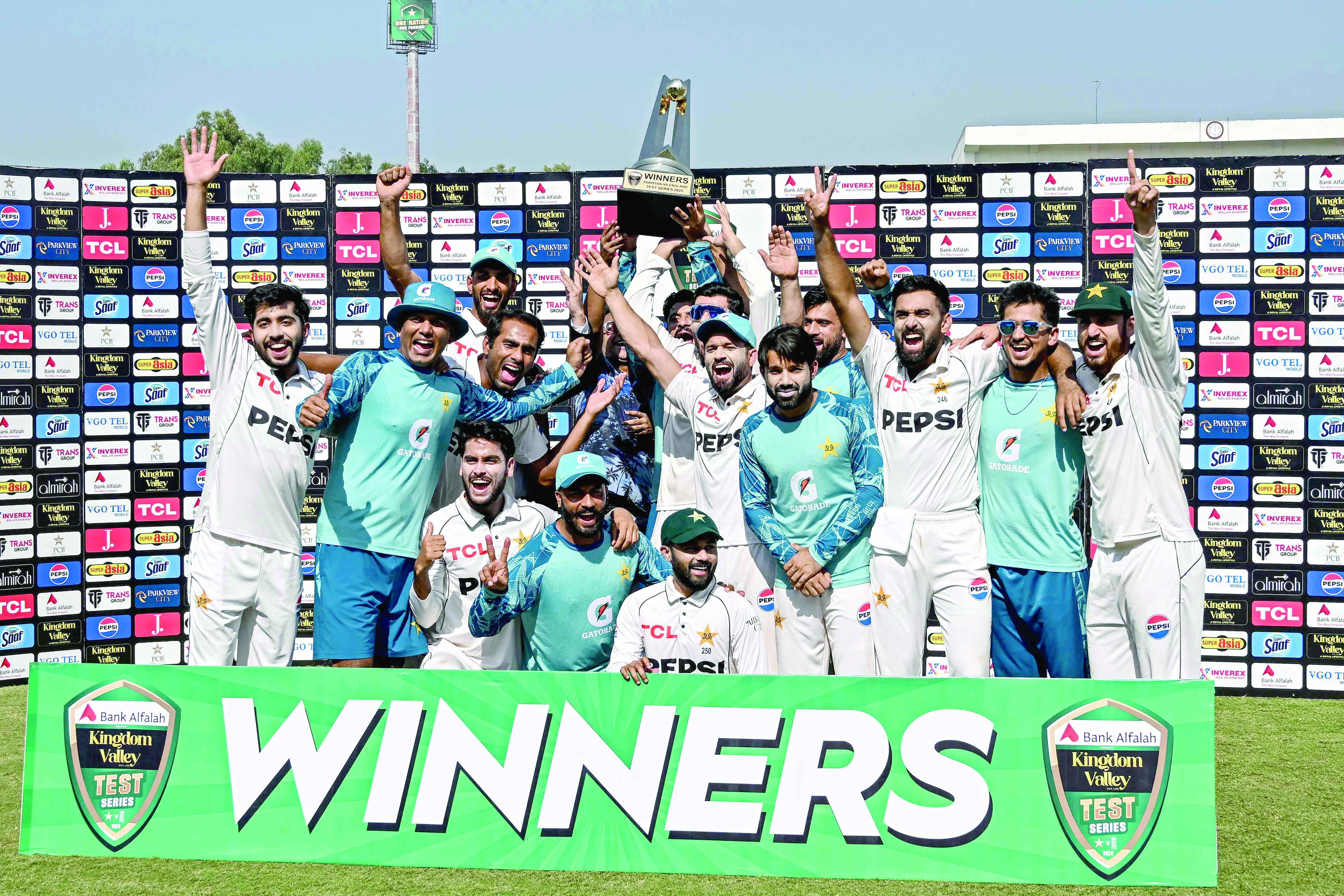
Where there's a will, there's a way! The adage aptly fits the Pakistan cricket team's emphatic series win over England on Saturday, achieved after nine long years, at the Rawalpindi Cricket Stadium.
The two back-to-back Test victories at Multan and Pindi, following the harrowing innings and 47-run drubbing in the first Test at Multan, marks one of the most amazing turnarounds in the game's 150-year history.
Former England skipper Nasser Hussain summed up Pakistan's handsome win on Saturday inside three days over Ben Stokes and his men when he said, "Pakistan discovered the kryptonite to Bazball."
Quite remarkably, the turnaround was pulled off by a side that had seemingly been stuck in a deep, dark pit of defeats, despair and despondency barely a fortnight ago.
Embarrassed by an unprecedented three-and-a-half-year winless streak at home, the woes of Shan Masood and his men compounded with each passing day. Adding insult to injury was the scorn and ridicule heaped by the hostile Indian press who went as far as to demand of the International Cricket Council (ICC) to withdraw Pakistan's Test status following the poor run of defeats.
However, all that changed two weeks back when, in a rare masterstroke by PCB Chairman Mohsin Naqvi, the reins of Pakistan Cricket were handed to former Test cricketer and coach Aaqib Javed - one of the finest cricket brains in the country.
A man of wisdom and integrity, Javed has proved to be the Renaissance Man for Pakistan Cricket since taking over. To his credit, he was quick to identify the problems plaguing the game, none more damaging than the groupings in the team that had taken away the players' focus and hurt their morale.
He convinced Naqvi to sideline two of the team's biggest superstars, Babar Azam and Shaheen Afridi, who were suspected to have formed cliques that clearly divided the dressing room. Non-performers like Naseem Shah, Shadab Khan, Hasan Ali, Iftikhar Ahmed and others were also ignored in the selection of the team as Aaqib gained control of things.
The entire strategy of the national team management, if any, was sent out of the window by Aaqib who decided that the only way out of the quagmire for Pakistan is to play on its strength - which are the spinners and the spinning tracks.
With barely a four-day gap between the first and the second Test, it was a massive challenge for Aaqib and Company to not only convert the lifeless Multan track into a turner, but to also select the best spinners in the business to tame the formidable England side which was riding a wave of success after inflicting the innings victory in the first Test.
It, indeed, required a superhuman effort on the part of Aaqib, pitch curator Tony Hemmings and the ground staff to produce the turning track for the second Test at Multan. The move was complemented by the induction of Pakistan's two forgotten spin-twins – Sajid Khan and Noman Ali – in the second Test.
The rest, of course, is history.
Both Sajid and Noman completely bamboozled the English batsmen at Multan and Rawalpindi with their guile and repertoire, taking 39 out of the 40 wickets to fall in the two Test matches and winning the series for Pakistan 2-1.
Not only did the spin-twins mesmerise the opposition, their infectious enthusiasm and lion-hearted efforts infused a renewed spirit and vigour into an utterly demoralised Pakistan squad, which was a heartwarming sight for the home fans.
The team effort, self-belief and application displayed by the Pakistan players have been the key to the amazing turnaround in the England series.
Having said that, the many chinks in the team's armour could not be overlooked if it is to sustain its recent success. The brittle top order, the lacklustre performance of pacers, the recuring fitness issues and lack of professionally sound back-up are the key areas that need to be addressed on a war footing by the Pakistan Cricket Board (PCB).
With a busy, challenging cricketing season ahead of Pakistan that include the white-ball tour to Australia and Zimbabwe next month, the Test and T20 series in South Africa in December, the Test series against the West Indies at home in January followed by the ICC Champions Trophy 2025, the PCB needs to ensure a fair selection of players on the basis of merit and competence. The top performers of domestic cricket such as Kamran Ghulam, Aamir Jamal, Zahid Mahmood, Mohammad Hurraira, Haseebullah, Mohammad Hasnain, Jahandad Khan and the others must be groomed and given regular chances at the national level to ensure a bright future for Pakistan Cricket.




1732256278-0/ellen-(1)1732256278-0-165x106.webp)
1725877703-0/Tribune-Pic-(5)1725877703-0-165x106.webp)
1732258765-0/Express-Tribune-(3)1732258765-0-270x192.webp)
1732257283-0/Express-Tribune-(2)1732257283-0-270x192.webp)





1729841751-0/Untitled-design-(25)1729841751-0-270x192.webp)
1729770235-0/cover_1729751863FotoJet-(10)1729770235-0-270x192.webp)






COMMENTS
Comments are moderated and generally will be posted if they are on-topic and not abusive.
For more information, please see our Comments FAQ